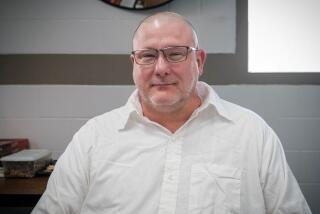Opinion: We need more prosecutors questioning their pursuit of the death penalty

A recently elected prosecutor in Florida announced Thursday that she would unilaterally take the death penalty off the table for murder cases handled by her office, a decision that drew a stern rebuke from some quarters, and led Florida Gov. Rick Scott to remove her from a pending case against an accused cop killer. But State Attorney Aramis Ayala, who represents two counties near Orlando, also drew accolades from others. Add me to the accolade list.
Ayala said Thursday she reached her decision after studying the role of the death penalty, and her role as a prosecutor, in seeking to achieve justice. The announcement came as a surprise. As the Orlando Sentinel noted, Ayala, a former assistant prosecutor in the office she now runs, waged a five-month election campaign without indicating she had doubts about the death penalty.
In fact, Jeff Ashton, her former boss and the incumbent she beat to win the office, said Ayala accepted a capital-punishment case assignment two years ago. “She came to me. She was really excited because she got her first death penalty case,” he told the Sentinel.
But isn’t this what we want elected officials to do? To look deeply at their roles, and to evolve positions as they learn? In Ayala’s case, once she became the linchpin in the death-penalty system – there is no death sentence for a jury to consider if the district attorney doesn’t seek it – she took it on herself to understand capital punishment within its entire context.
Ayala concluded that there is no reliable evidence to show the death penalty offers a public safety benefit or increases security for law enforcement, that capital punishment is not a deterrent to committing murder; offers “false promises” to families because executions occur rarely and long after the crime itself; and that millions of dollars spent pursing death sentences that likely won’t take place divert resources from the criminal justice system.
“What has become abundantly clear through this process is that while I currently do have the discretion to pursue death sentences, I have determined that doing so is not in the best interest of this community or the best interests of justice,” Ayala said. “Let me be very clear: I will continue to hold people who do harm in this community accountable for their actions. I will do so in a way that is sensible, fair and just.”
Ayala is the second recently elected prosecutor to reject the death penalty. Denver Dist. Atty. Beth McCann made a similar announcement in January, but in her case, it was the fulfillment of a campaign promise in a region where death sentences are rarely handed down. The state has executed only one person since capital punishment was reinstated in 1976, and there are only three people on Colorado’s death row.
A capital case doesn’t get to a jury without one person – the district attorney – first making a decision.
Florida has executed 92 people since the practice was resumed, and 396 people sit on the state’s death row (though that could change due to recent legal problems with how death sentences used to be determined). Nine of the executions were in cases covered by what is now Ayala’s district.
Orlando Deputy Police Chief Robert Anzueto – whose officer, Lt. Debra Clayton, was killed as she confronted murder suspect Markeith Lloyd – argued that “the decision for someone to live or die in a case like this should be in the hands of a jury and not for one person to decide.”
Yet a capital case doesn’t get to a jury without one person – the district attorney – first making a decision. Murder charges are overwhelmingly prosecuted as a state crime, but there are wide county-by-county disparities within a state on whether the death penalty is sought. Whether someone in Florida – or California, for that matter – faces a capital charge depends on that first-step decision by the county district attorney.
So a crime that might be considered worthy of the death penalty in one county might not be in the next, the definition of arbitrary application.
While people perceive that a jury of peers is somehow a failsafe against injustice, history shows that’s not the case. In fact, in capital punishment cases the jury is not even necessarily made up of “peers,” since anyone who opposes the death penalty tends to be rejected “for cause,” leading to a jury not reflective of the community and more likely to find a defendant guilty.
That Ayala has taken the death penalty off the table for cases handled by her office will have political ramifications in Florida, and for her. It’s unclear whether the governor will seek to take more murder cases away from her office, a move that would likely draw challenges. Ayala was elected, and the democratic solution for those who disapprove of her decision is the next election, not gubernatorial override.
In fact, the November 2016 elections saw a number of tough-on-crime DAs unseated by challengers propelled by the Black Lives Matter movement and justice reformers (Ayala’s race was part of that), and several of the elections occurred in counties that account for a staggering portion of the nation’s death sentences (further proof of its arbitrary use).
Still, it was a brave step for Ayala to take, and more district attorneys should exercise their prosecutorial discretion in recognition of the critical problems with the death penalty, including that it disproportionately affects the poor and minorities. Beyond its fundamental inhumanity, it is too flawed a system to be trusted as an arbiter of who should live or die.
Follow my posts and re-tweets at @smartelle on Twitter
MORE FROM OPINION
L.A. finally has the money to fight homelessness. Here’s how architecture can help the cause
More to Read
A cure for the common opinion
Get thought-provoking perspectives with our weekly newsletter.
You may occasionally receive promotional content from the Los Angeles Times.







